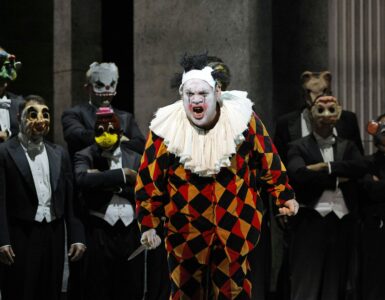
It”™s the time for the season of love – at least for the independent period dramas coming out of Great Britain this autumn. Following the romantic tales of Bright Star and An Education, we are now presented with The Last Station, Michael Hoffman”™s impressively moving and unexpectedly humorous look at the final days of Russian author Leo Tolstoy.
Tolstoy”™s body of work is considered among the most impressive in history. As The Last Station begins, his epic novels, Anna Karenina and War and Peace, have catapulted him to rock-star type super stardom in early twentieth century Russia. Tolstoy (Christopher Plummer) is trying to enjoy the final days of his life, but his affections and attentions are being grappled over by Sofya (Helen Mirren), his wife of his over fifty years, and Vladimir (Paul Giamatti), the head of the Tolstoian Movement, a large group of people whose lives are devoted to the promotion of Tolstoy”™s utopian ideals and theories.
The central and ironic conflict of The Last Station deals with the basest struggle over money in relation to love. Credit Hoffman”™s sharp script and deft direction with the fact that neither side is ever fully tagged as the villain in this conflict. Hoffman lets us see both sides”™ concerns for the future of Tolstoy”™s legacy and publishing rights. Sofya is looking out for her future and the future of her family, as a woman who has no other sustenance without her husband. Vladimir wants the importance of Tolstoy”™s message to reverberate through the lives of every Russian and therefore believes that the people themselves should own the rights to his works. Both sides battle in pleading their case as to which love is the most valid and worthy.

The only victim in this entire equation seems to be Tolstoy, who yearns merely to write, share ideas, tell stories, listen to music and enjoy his remaining days in peace. His only sympathetic ear appears in young Valentin (an endearingly innocent and eager James McAvoy). Planted as a spy by Vladimir to report on Sofya”™s doings, he arrives with a disciple-like awe for Tolstoy. Whenever Valentin becomes too enamored with pious devotion to the loftiness of Tolstoian ideals, however, Leo steers his focus more towards the more carnal pleasures of life, most particularly in the flesh of the independent and spirited Masha (Kerry Condon), a member of the local commune. The longer Valentin remains in the company of Tolstoy and his family, the more sympathetic he is to Sofya”™s plight and the more disillusioned he becomes with the movement, which believes in love for all humanity but considers the love of an individual to be almost condemnable. He is the only one who seems to understand that in the end when facing death, there are no winners, but merely losers who both loved different facets of the same man, and ultimately, their only comfort can be found in each other and the love they may have for another person.
Both Giamatti and Mirren shine and excel in their work to the extent that audiences are in danger of taking their gifts for granted. The true standout here, however, is Plummer, whose Oscar-worthy performance runs the gamut from playful to authoritarian to bellowing to exhausted. Though the film suffers from a subplot between Masha and Valentin that feels not quite fleshed out, the overall arc of the main throughline is terribly moving and utterly engaging.
Review by Zach Jacobs






I seriously loved encountering this article, so please continue publishing a lot more like it.
I have a distinct take on this and I truly wished I had the time right now. I’ll go ahead and subscribe and when I have an opportunity I’ll submit my response. Stunning blog by the way. I’m trying to get one going but my programming friend is slacking off on me. Thanks again for your post!
Your Friend – Joy.